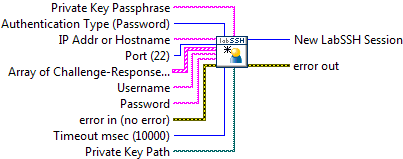New Session.vi¶

New Session.vi connector pane
Description¶
Authenticate a new SSH session.
New in version 2.5: Support for IPv6 hosts was added. Prior to 2.5, only IPv4 was supported. This change is transparent, and no extra configuration is necessary to connect to an IPv6 host.
New in version 2.5: Support for agent-based public key authentication was added. See the control Authentication Type for usage details. Use this to allow tools such as Pageant to broker authentication.
Inputs¶
 IP Addr or Hostname¶
IP Addr or Hostname¶
| Required: | Yes |
|---|
IP address or network hostname of the remote SSH host.
New in version 2.5: Support for IPv6 hosts was added.
| Examples: |
|---|
foo.bar.com192.168.99.33fd01::00de:12aa:23bf
 Port¶
Port¶
| Required: | No |
|---|---|
| Default: | 22 |
TCP port number on which to attempt to establish SSH session.
It is not typical to change this from the default value.
Changed in version 2.5: This control has been changed to an unsigned 16-bit number  .
It was previously a signed 16-bit number
.
It was previously a signed 16-bit number  , which prevented connections to any TCP port
greater than 32768.
, which prevented connections to any TCP port
greater than 32768.
 Username¶
Username¶
| Required: | Yes |
|---|
Remote user account name under which to establish SSH session.
| Examples: |
|---|
rootbob
 Password¶
Password¶
| Required: | Yes (Password Authentication Only) (see Authentication Type) |
|---|
Password to use for authentication.
 Timeout msec¶
Timeout msec¶
| Required: | No |
|---|---|
| Default: | 10000 (10 seconds) |
Amount of time to wait, in milliseconds, to wait for a response from the remote host before a timeout error occurs.
 Authentication Type¶
Authentication Type¶
| Required: | No |
|---|---|
| Default: | 1: Password |
Select authentication method used to establish SSH session.
New in version 2.5: Agent authentication was added.
| Values: | 0: Keyboard-Interactive: Under keyboard-interactive authentication, the remote host will issue a “challenge” phrase, to which the client must issue a correct response. Note Some hosts issue challenge-phrases which appear exactly like a password prompt, e.g. “Password: “. If authentication fails using Password Authentication, try using Keyboard-Interactive. 1: Password: Use a plain password to authenticate the SSH session. 2: Public Key: Use public-key authentication, under which the client must prove its control of the private key by performing a cryptographic operation on a server-supplied challenge. Must provide a path to the private key file via the input terminal Private Key Path 3: Agent: Use an SSH agent (such as Pageant) to broker a public key authentication with the remote host.
|
|---|
 Private Key Path¶
Private Key Path¶
| Required: | Yes (Public-Key Authentication Only) (see Authentication Type) |
|---|
Specify the path to the private key file to be used for authentication.
 Private Key Passphrase¶
Private Key Passphrase¶
| Required: | No (Public-Key Authentication Only) (see Authentication Type) |
|---|---|
| Default: | Empty String  |
If the private key file is encrypted with a passphrase, it must be supplied here.
 Array of Challenge-Response Pairs¶
Array of Challenge-Response Pairs¶
| Required: | Yes (Keyboard-Interactive Authentication Only) (see Authentication Type) |
|---|
An array of challenge-response pair clusters.
This should contain all expected challenges to be encountered during authentication, matched with the appropriate response answer.
Elements:
Challenge-Response Pair [Cluster]
A pair of strings - one a challenge, the other a response to that challenge - which is expected to be encountered during authentication. If the challenge string is encounterd during authentication, LabSSH will respond with the given response string.
Members:
Challenge
LabSSH will attempt to match this text with all or part or the challenge phrase emitted by the remote host. The corresponding response will be sent only if a match is encountered.
Example:
Suppose the remote host issues a challenge string
Password:. Any of the following entries will result in a match: *Pass*Password*ssword:
Response
- Response to be sent to the server when a matching challenge phrase is encountered.
 error in¶
error in¶
| Required: | No |
|---|---|
| Default: | No Error |
Incoming error from previous VI call. Is passed through to error out.
Warning
LabVIEW will not execute Call Library Function Node if there is an error present on the wire. Ensure that there is no error prior to calling this VI – unexpected behavior will occur.
 New LabSSH Session
New LabSSH Session error out
error out